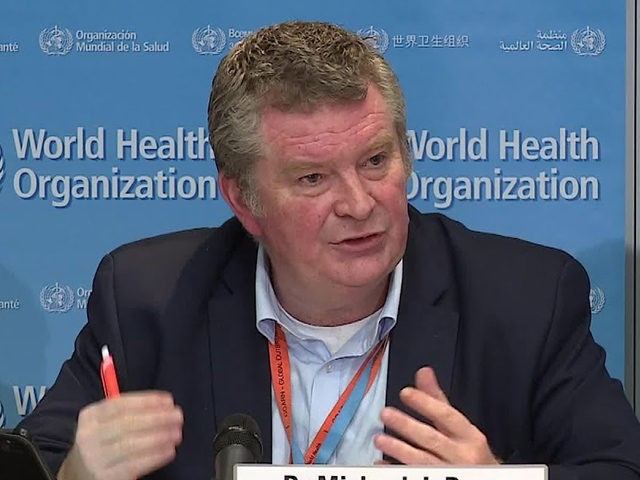Dr. Michael Ryan, executive director of the World Health Organization’s Health Emergencies Program, suggested during a March 30 press conference that individuals infected with the Chinese coronavirus should be removed from their homes to prevent further spread of the deadly disease.
The clip, first reported by Fox News Channel’s Tucker Carlson, shows Ryan warning that “most of the transmission that’s actually happening in many countries now is happening in the household at family level” before he speculates on measures to prevent the infection of patients’ relatives.
A transcript is as follows:
REPORTER: I wanted to ask; we’ve seen some different approaches to quarantine in China and in European countries with group quarantine used to good effect in China. Do you think that home quarantine will be as effective anywhere for people who are positive, or would central quarantine be needed in order to have the same success that China has had?
DR. MICHAEL RYAN: Yes. Just so we get our terms right and we can explain ourselves properly, we tend to use the word isolation for someone who is a case, confirmed. We tend to use the word quarantine for someone who’s at risk of being a case, usually a contact, so on that basis we advise that all suspect cases are tested, and all suspect cases are isolated in an appropriate medical facility. I think nobody disagrees with that, where the capacity exists. When we come to contacts, it very much depends on the context and the intensity of any given moment. In low-incidence areas where there are sporadic cases or clusters, we advise that all contacts should be quarantined. Ideally, that quarantine should occur in a place other than the home — and for this reason, one, because if that person gets sick, they may already have infected their family. But that’s not always possible, so at least quarantining contacts at home with good health advice about not transmitting disease if they become sick and with regular monitoring of that individual is an option for countries.
It is difficult to do that in the middle of intense transmission where you might have hundreds of thousands of contacts, because you’re having thousands of cases a day. It is difficult to deal with that, so home quarantine of contacts is acceptable with appropriate information, education, and, more importantly, a very rapid system of getting those people out of their homes if they become sick. I listened to the President of Singapore this morning as he had a conference call with the Director-General and the clarity of that in Singapore, that ability not only to isolate cases but to rapidly detect illness in the contacts and remove those contacts should they become sick was a central part of that. As he said, they’re using apps now to do that, they’re testing apps, but they didn’t do it with apps in Singapore. They did that with community workers, with public health workers visiting the houses, checking on people, checking their health status every day and saying, “how are you, have you got a fever, have you got a cough?” And if a contact had developed a cough or a fever, they were taken immediately for testing. So yes, we need the information technology tools, they help.
They’re not the solution. Right now, we don’t have an alternative to what we would have considered, in the old days, bootleather epidemiology: public health practitioners, doctors, nurses, community workers working with communities to detect cases at community level. And the most likely person to become a case is someone who’s been a significant contact of another case, and at the moment, in most parts of the world due to lockdown, most of the transmission that’s actually happening in many countries now is happening in the household at family level. In some senses, transmission has been taken off the streets and pushed back into family units. Now we need to go and look in families to find those people who may be sick and remove them and isolate them in a safe and dignified manner, so that’s what I was saying previously; the transition from movement restrictions and shutdowns and stay-at-home orders can only be made if we have in place the means to be able to detect suspect cases, isolate confirmed cases, track contacts and follow up on the contacts’ health at all times and then isolate any of those people who become sick themselves. [Emphasis added]

COMMENTS
Please let us know if you're having issues with commenting.